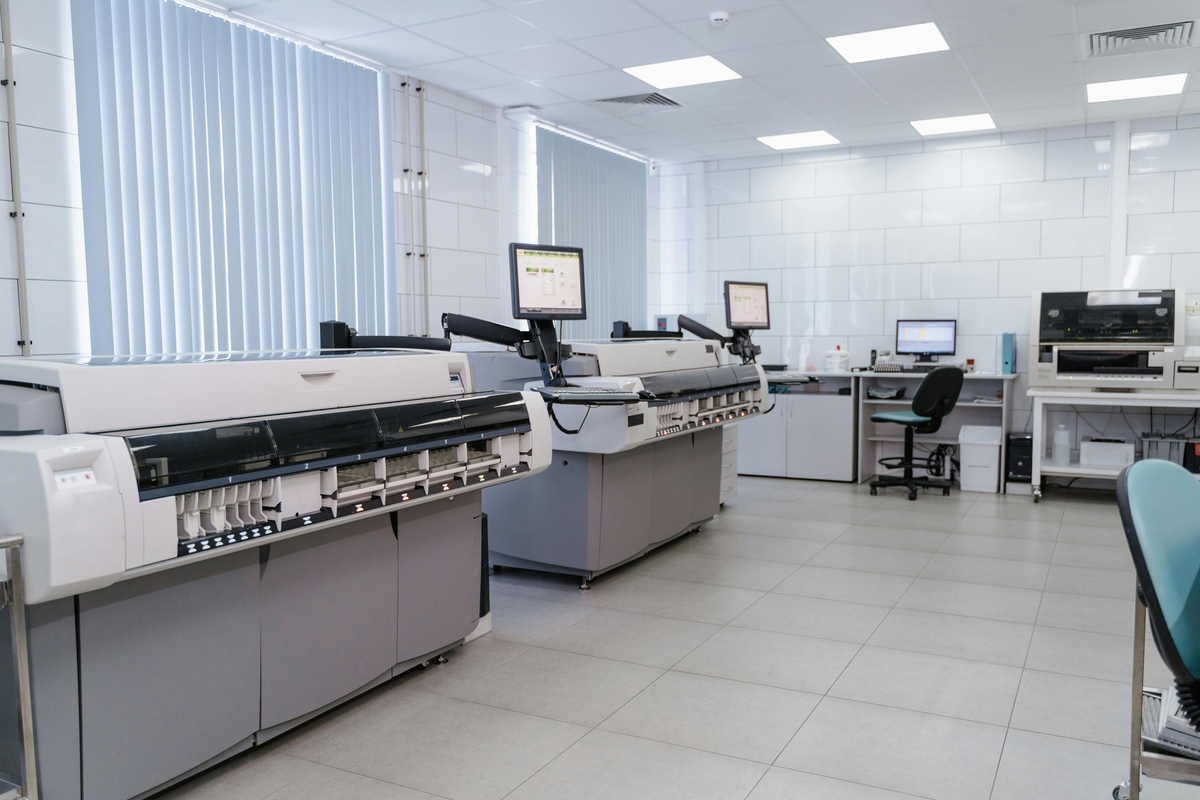Exploring the Molecular Diagnostics Market: Trends, Growth Drivers, and Future Potential

Strong 8k brings an ultra-HD IPTV experience to your living room and your pocket.
The Molecular Diagnostics Market is a vital and rapidly evolving segment within the broader healthcare diagnostics landscape. With the continuous advancement of precision medicine, molecular diagnostics is becoming indispensable in detecting and managing diseases, including infectious diseases, genetic disorders, and cancers. This blog will delve into the key elements driving the molecular diagnostics market, its growth prospects, and the trends that are likely to shape its future.
1. Understanding Molecular Diagnostics
Molecular diagnostics refers to a class of diagnostic tests that analyze biological markers in an individual’s genome and proteome—the genetic material and proteins within the body. The technology is used to detect specific sequences in DNA or RNA (including single nucleotide polymorphisms (SNPs), deletions, insertions, and rearrangements) that may or may not be associated with disease. These diagnostics are instrumental in providing detailed insights into the genetic and molecular basis of various health conditions, thus aiding in early detection, precise diagnosis, and even forecasting disease progression.
2. Market Growth and Drivers
The molecular diagnostics market has witnessed impressive growth over the past decade, and projections suggest that this trend will continue. The following are some of the primary drivers:
a. Rise of Infectious Diseases and Pandemic Impact
The COVID-19 pandemic underscored the importance of rapid and accurate diagnostics, and molecular diagnostics emerged as a powerful tool for detection and management. Reverse Transcription Polymerase Chain Reaction (RT-PCR) tests became the gold standard for detecting SARS-CoV-2, demonstrating the immense value of molecular diagnostics in managing infectious diseases. The pandemic catalyzed the adoption of molecular diagnostics, a momentum that continues as the world increasingly prepares for potential future outbreaks of infectious diseases like influenza, respiratory syncytial virus (RSV), and others.
b. Advancements in Genomic Medicine and Precision Healthcare
Advances in genomic research and the Human Genome Project have paved the way for personalized medicine. By analyzing the genetic makeup of patients, healthcare providers can tailor treatments that are highly specific to an individual's molecular profile. Molecular diagnostics is at the forefront of this revolution, offering tools that allow healthcare professionals to diagnose conditions at the molecular level, potentially even before symptoms appear. This proactive approach is especially critical in cancer, where early detection can significantly improve survival rates.
c. Growing Demand for Non-Invasive Diagnostic Techniques
Non-invasive diagnostics is a key area of interest, driven by patient demand for less discomfort and reduced risk. Liquid biopsies are a promising alternative, enabling the detection of genetic mutations from a simple blood sample. This technology allows for the continuous monitoring of cancer progression without invasive surgical biopsies, thereby promoting the frequent use of molecular diagnostics in oncology.
d. Government Support and Favorable Reimbursement Policies
In many regions, governments are supporting the molecular diagnostics market by funding research initiatives and offering reimbursement options for certain diagnostic tests. For instance, programs in the U.S. and European Union are focused on integrating molecular diagnostics in healthcare systems, which facilitates better patient outcomes and supports market growth. This regulatory support creates a conducive environment for the molecular diagnostics market to expand further.
3. Market Segmentation
The molecular diagnostics market can be segmented in various ways, each representing different technologies, applications, and regional dynamics.
a. By Technology
Polymerase Chain Reaction (PCR): PCR is one of the most common and widely used molecular diagnostic technologies. It is valued for its accuracy, speed, and cost-effectiveness. Real-time PCR and quantitative PCR (qPCR) are particularly popular for their ability to quantify the amount of a specific DNA or RNA target.
Next-Generation Sequencing (NGS): NGS has revolutionized genomics, allowing for high-throughput sequencing of the genome, transcriptome, and epigenome. This technology is frequently used in oncology, prenatal screening, and rare disease diagnostics.
In Situ Hybridization (ISH): Techniques like fluorescence in situ hybridization (FISH) are instrumental in detecting specific DNA sequences on chromosomes, often used in cancer diagnostics.
Isothermal Nucleic Acid Amplification Technology (INAAT): This technique is commonly used for point-of-care testing and is advantageous for settings with limited resources, as it does not require complex instrumentation.
b. By Application
Infectious Diseases: This is the largest application segment for molecular diagnostics, driven by the need for rapid and accurate tests for diseases like HIV, hepatitis, and tuberculosis.
Oncology: Molecular diagnostics plays a critical role in cancer screening, diagnosis, and monitoring. Tests that identify specific genetic mutations, such as BRCA for breast cancer, guide therapeutic decision-making.
Genetic Testing: For prenatal screening and rare disease diagnosis, genetic testing is becoming increasingly common.
Blood Screening: Ensuring the safety of blood transfusions and donations, molecular diagnostics screens blood for pathogens like HIV and hepatitis B.
c. By End-User
Hospitals and Diagnostic Laboratories: These are the primary users of molecular diagnostics tools, providing services for routine diagnostics as well as specialized genetic testing.
Academic and Research Institutes: Molecular diagnostics is also extensively used in research settings to further understand diseases at the molecular level.
Homecare Settings: The advent of portable molecular diagnostic devices has made it possible for patients to conduct certain tests at home, further driving the growth of the market.
4. Challenges Facing the Molecular Diagnostics Market
While the future looks promising, the molecular diagnostics market also faces some challenges:
a. High Costs
The technology and equipment required for molecular diagnostics can be expensive, limiting accessibility in low-resource settings. Although costs have decreased over time, they remain significant for advanced diagnostic technologies like NGS and personalized medicine.
b. Complex Regulatory Requirements
Molecular diagnostics is subject to rigorous regulatory scrutiny, given the impact of its results on patient outcomes. Variability in regulatory policies across regions poses a barrier for market expansion, especially for emerging markets.
c. Data Privacy Concerns
Molecular diagnostics often involves sensitive genetic information, which raises privacy concerns. As healthcare systems adopt digital solutions, safeguarding patient data becomes critical, and companies must comply with data protection regulations like HIPAA in the U.S. and GDPR in Europe.
5. Key Players and Competitive Landscape
Some of the notable players in the molecular diagnostics market include Roche Diagnostics, Thermo Fisher Scientific, Qiagen, Abbott Laboratories, and Bio-Rad Laboratories. These companies are actively developing new technologies and expanding their portfolios to cater to the growing demand. Partnerships, mergers, and acquisitions are common strategies among these players to strengthen their market position.
6. Future Trends in Molecular Diagnostics
a. Expansion of Point-of-Care Testing
The demand for rapid and decentralized testing will likely fuel the growth of point-of-care molecular diagnostics. These solutions are especially valuable in rural areas and low-resource settings, where access to laboratory infrastructure may be limited.
b. Artificial Intelligence and Big Data Integration
Artificial intelligence (AI) and big data analytics are increasingly being integrated into molecular diagnostics. AI algorithms can assist in interpreting complex genetic data, making diagnostic processes faster and more accurate. Additionally, big data analytics can help identify patterns in patient populations, aiding in disease prediction and preventive medicine.
c. Development of Companion Diagnostics
As precision medicine advances, there is a growing need for companion diagnostics, which are tests developed to determine the suitability of specific therapies for individual patients. For example, some cancer treatments are only effective for patients with specific genetic mutations, and companion diagnostics ensure that patients receive treatments that will be most effective for their genetic profiles.
d. Growth in Microbiome Research
The microbiome, the collection of all microorganisms in a particular environment, has been linked to various health outcomes, including metabolic and autoimmune diseases. As research in this field progresses, microbiome-based diagnostics may emerge as a new frontier within molecular diagnostics, providing insights into health beyond traditional genetic testing.
Conclusion
The molecular diagnostics market is on a trajectory of rapid growth, fueled by technological advancements, increased prevalence of chronic diseases, and the ongoing evolution of personalized medicine. While the market faces challenges related to cost and regulation, the continued development of innovative solutions and supportive government policies are likely to drive its expansion. As healthcare shifts towards a more precise, data-driven approach, molecular diagnostics will play a pivotal role in shaping the future of disease detection, management, and prevention.
Note: IndiBlogHub features both user-submitted and editorial content. We do not verify third-party contributions. Read our Disclaimer and Privacy Policyfor details.







